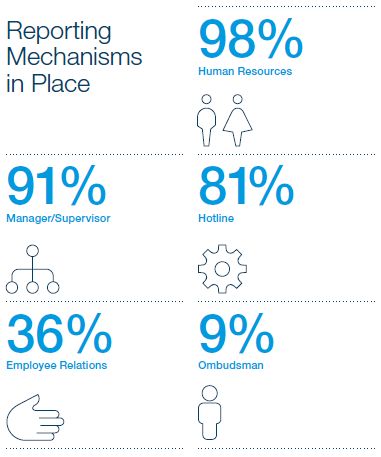The #MeToo + #TimesUp movements have sparked an undeniably important conversation. They have brought to light allegations of sexual assault, harassment + discrimination in society at large and in the workplace in particular. No company or industry is immune from these issues. For employers receiving complaints of inappropriate or illegal behavior, the stakes have never been higher.
The #MeToo and #TimesUp movements have sparked an undeniably important conversation.
They have brought to light allegations of sexual assault, harassment and discrimination in society at large and in the workplace in particular. For employers receiving complaints of inappropriate or illegal behavior, the stakes have never been higher.
No company or industry is immune from these issues. In the first year of the #MeToo era, on average, at least one prominent figure was publicly accused of misconduct every day.1 Enforcement efforts have been similarly expansive. The EEOC filed 50% more sexual harassment suits during roughly the same period.2 Its recovery on behalf of sexual harassment victims ballooned almost 50% as well, to nearly $70 million.
Legislative changes rapidly followed. Some states quickly barred confidentiality provisions in sexual harassment settlements. Others limited or banned arbitration of sexual harassment claims. California even enacted legislation requiring a minimum number of women on boards of directors.
In the current environment, business leaders face enormous pressure to prevent or eradicate workplace misconduct. Every organization should expect that the speed and precision of its response will be scrutinized. To help in-house counsel prepare for these crucial events, Proskauer launched its Workplace Complaints in the #MeToo Era survey.
We set out to solicit and aggregate input from organizations grappling with these issues in real time. We began by surveying individuals who make high-level legal decisions regarding employment issues. We supplemented that input through discussions with focus groups of in-house counsel and through interviews with multiple Proskauer partners who practice in this area.
The result of these efforts is unprecedented insight into the rapidly evolving landscape of workplace complaints. The #MeToo movement is far from over, but we believe this analysis will be critical in navigating the current challenges and the changes still to come.
We know what the law is, but how do we change culture?
EXECUTIVE SUMMARY
Impact
Harassment complaints have increased, but so have other types of workplace complaints. Among survey respondents:
42% reported an increase in harassment complaints
23% reported an increase in discrimination complaints
35% reported an increase in other workplace complaints, such as retaliation
Despite increasing complaints, organizations continue to rely heavily on traditional reporting mechanisms rather than introducing new ones. Some organizations are finding that employees are more likely to initiate complaints through lawyers or to make anonymous complaints.
Challenges
Organizations are facing three major challenges in the wake of the #MeToo movement:
- Keeping Up With the Proliferation of New State and Local Laws
- Calibrating Training for the #MeToo Era
- Choosing the Right Resource When Faced With a Complaint Organizations are also facing a number of other external reputational challenges, as well as internal cultural ones.
Best Practices
Five major best practices emerged from our research:
- Demonstrating Leadership Buy-In
- Maximizing the Value of Training
- Optimizing Policies
- Leveraging Outside Counsel
- Keeping an Eye on Developing Trends
Best practices for the #MeToo era are still evolving, and organizations continue to look for guidance on adapting to the #MeToo movement.
Impact.
The most striking feature of #MeToo was the breadth of the impact.
With great variation in size, geographic location, and industry, two-thirds of survey respondents reported a high or moderate impact on their organizations.
That impact was felt most directly through a surge in complaints. Most organizations understandably saw the greatest uptick in harassment complaints. Many organizations, however, reported a similar effect on other types of complaints as well, including retaliation.

In at least some organizations, #MeToo has prompted complaints about conduct that predated the movement and was well outside any applicable statute of limitations. A significant number of respondents saw complaints based on conduct that was more than a year old. Some even received complaints based on conduct that was more than 5 years old. At one of Proskauer's Peer Perspectives events, several companies reported having received more "stale" or "time-barred" complaints, including one going back to the 1980s. Companies are also seeing complaints about the conduct of individuals that, in some instances, predates their employment with their current employer.
Respondents also observed changes in the source of complaints. One in five found that employees were more likely to initiate a complaint through a lawyer than in the past. That effect was not isolated to harassment complaints. Similarly, some respondents – and Peer Perspectives participants – saw an increase in all types of anonymous complaints and complaints that surfaced through non-traditional means like social media and reports from witnesses/bystanders.

In the face of increasing complaints, most organizations relied on existing mechanisms for receiving complaints. A minority of respondents (15%) introduced new reporting mechanisms, most commonly a hotline. Whether they introduced new mechanisms or not, most organizations provided multiple reporting channels. Respondents leaned heavily on human resources, management and, to a slightly lesser extent, hotlines.

Proskauer Perspective
The significance of this trifecta – older complaints, anonymous complaints and unorthodox reporting – coupled with increased public scrutiny of corporate responsiveness, has added pressure on in-house teams to employ effective investigation methods, quickly gather facts and ascertain appropriate remedial action. This has punctuated the need for effective training of human resources personnel on conducting investigations. Additionally, in-house counsel need to be more than just legal advocates. Because of potential reputational and brand damage, older or outdated complaints have resulted in investigations and disciplinary action taken despite the fact that the alleged conduct predated employment, often by many years.
To view the full article click here
Footnotes
1 #MeToo: One Year Later: https://www.bloomberg.com/graphics/2018-me-too-anniversary/. The beginning of the #MeToo era is commonly regarded as October 2017, when allegations of misconduct against movie producer Harvey Weinstein became widely publicized.
2 What You Should Know: EEOC Leads the Way in Preventing Workplace Harassment: https://www.eeoc.gov/eeoc/newsroom/wysk/preventing-workplace-harassment.cfm.
The content of this article is intended to provide a general guide to the subject matter. Specialist advice should be sought about your specific circumstances.


